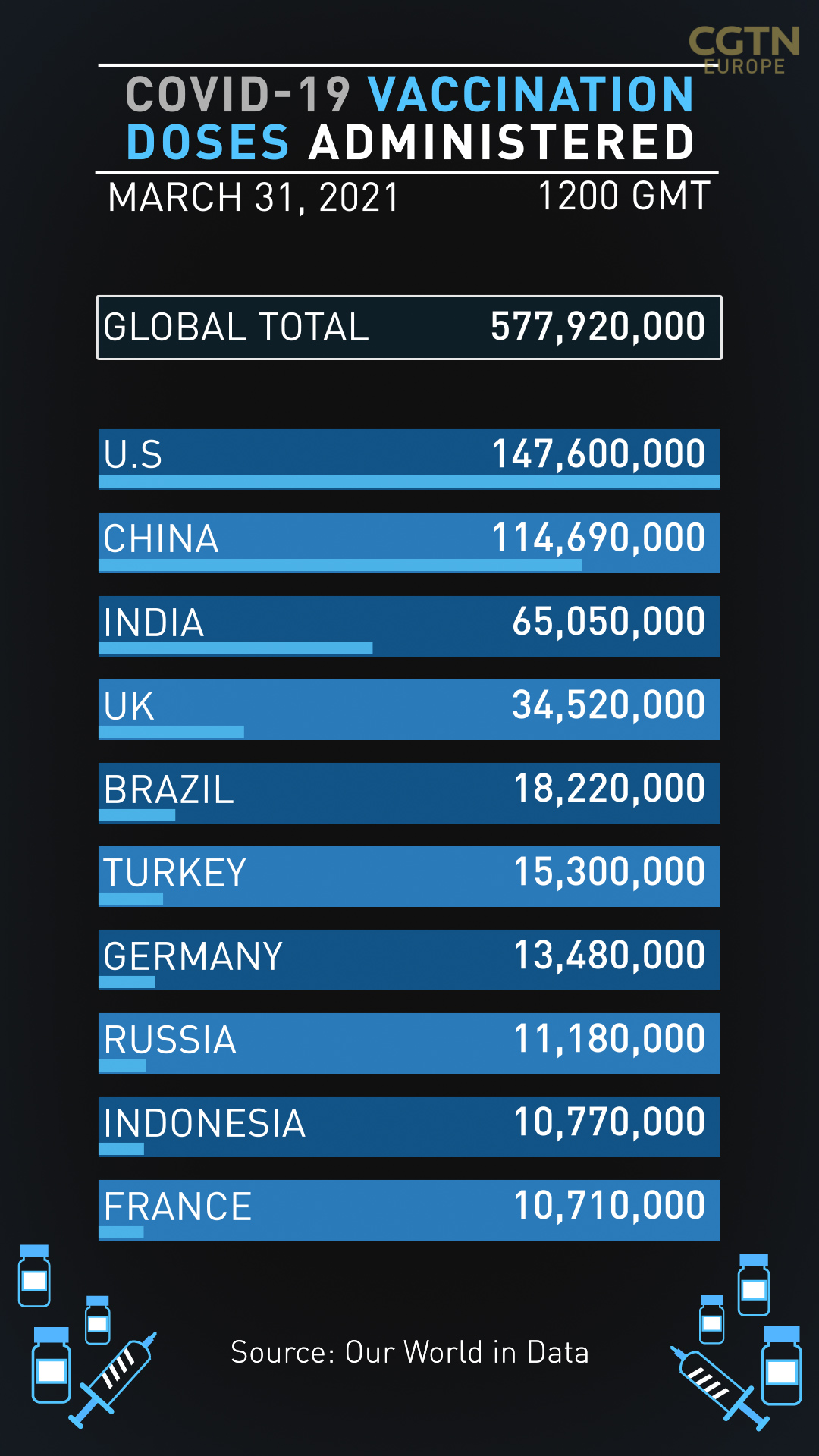TOP HEADLINES
- The Oxford University-AstraZeneca vaccine has been renamed Vaxzevria. The name change was approved on March 25 following a request from the company and was announced on the website of the European Medicines Agency (EMA). However, the new name does not imply a change in the formula of the jab.
- Europe's vaccination campaign is "unacceptably slow," according to the World Health Organization's regional director for Europe, Hans Kluge, who added that vaccines "present our best way out of this pandemic – not only do they work, they are highly effective in preventing infection."
- France's Culture Minister Roselyne Bachelot has been released from hospital after being admitted last week following a positive test for the virus.
- Germany's Chancellor Angela Merkel has called on the country's citizens to stay at home over the Easter weekend in a bid to prevent a further spread of the virus. "It should be a quiet Easter, with those closest to you, with very reduced contact. I urge you to refrain from all non-essential travel," she added.
- Meanwhile, Germany's President Frank-Walter Steinmeier has become the first German official to receive a dose of the AstraZeneca jab, with the hope it will increase confidence in the vaccine, following a small number of blood clot reports.
- Pfizer and BioNTech have said their vaccine has about 91 percent efficacy at preventing the disease, while it showed 100 percent efficacy in preventing illness among 800 trial participants in South Africa.
- Sweden now expects to offer all adults a first dose of a vaccine by August 15, later than its original plan of the end of June as officials cited a deal in jab deliveries.
- France has imposed a nationwide month-long lockdown to curb a third wave of the virus. Schools will close for at least three weeks, people will work from home and travel within the country will be banned for a month after Easter. "We will lose control if we do not move now," President Emmanuel Macron said in a television address.
- Meanwhile, France's Health Minister Olivier Veran says the peak of the epidemic is only seven to 10 days away in the country, with more than 5,000 virus patients in intensive care, the highest figure since October.
- Italy has made inoculations mandatory for all health workers, including pharmacists, in a potentially controversial move aimed at protecting the most vulnerable and fighting back against significant anti-vaccine sentiment in the country. Those who refuse could be suspended for the rest of the year without pay.
- The Dutch government wants to use the Eurovision Song Contest, due to take place in Rotterdam's Ahoy arena in May, as a test event, with 3,500 spectators allowed for all the rehearsals and the three big shows. There will be extensive safety measures for the 39 countries taking part.
- Vaccine developer Johnson & Johnson has said a batch of its jabs failed quality standards and cannot be used. The drug maker has not said how many doses were lost, nor how the problem would impact future deliveries.
02:29

ACROSS EUROPE
Stuart Smith in Brussels
Belgium's federal government is speeding up the introduction of new coronavirus legislation after a court ruled the current basis is illegal.
Judges decided the law restricting the freedom of Belgians was not designed for the closure of establishments, the suspension of compulsory education or the issuing of fines for breaches.
The Human Rights League, which took the case to court said: "Even in a health or security crisis, the principles of the rule of law and legality must prevail."
The state has 30 days to pass new laws to justify the current measures, or it will be fined $5,869 per day.
The minister of justice says nothing will change while the government appeals and that work will continue on a new Pandemic Law, due to be voted on after the Easter holidays.
READ MORE
'World's first' animal COVID-19 vaccine
China exports half its vaccine production
The big companies against deep sea mining
Penelope Liersch in Budapest
Prime Minister Viktor Orban addressed the nation on state television on Wednesday night following weeks of record COVID-19 deaths and hospitalizations. Hungary currently has the world's highest daily coronavirus death rate per capita.
Orban made it clear he believes there are two to three more difficult weeks ahead and insisted the health care system still has room, saying half the beds set aside for coronavirus patients are free.
This is in contrast to weeks of local media reports that hospitals are struggling and that some intensive care units are full, with not enough ventilators available at times.
It comes a day after the Hungarian independent media wrote an open letter accusing the government of hiding the severity of the pandemic as journalists have not been allowed into hospitals or to speak to medics – saying free information could save lives.
Orban addressed the independent media, saying: "Now is not the time to go into hospitals to make camouflage videos or fake news."
00:20

Ryan Thompson in Frankfurt
State leaders who had been firmly against introducing new measures to confront a third wave of coronavirus appear to be loosening their stance as the number of new infections rises in Germany.
That includes some in the ruling party, the Christian Democrats (CDU), the newly appointed chief of which has clashed with Chancellor Angela Merkel over her desire to put Germany back under a strict lockdown. He told broadcaster ZDF last night that Easter measures are necessary.
Germany's federal and state governments have been at odds in recent weeks and meetings have gone late into the night, sometimes ending with no firm policy agreement. It's partially a power struggle and partially a game of politics, German affairs columnists have told me.

France has imposed a nationwide month-long lockdown to curb a third wave of the virus. /AP
France has imposed a nationwide month-long lockdown to curb a third wave of the virus. /AP
FROM OUR GLOBAL COLLEAGUES
CGTN Europe: The Answers Project: Are we alone in the universe?
CGTN China: Sinovac and Sinopharm jabs show safety and efficacy, WHO panel finds
CGTN America: Shortage of critical medications for ICU patients in Brazil
CGTN Africa: WTO says 2021 global trade recovery rests on vaccines
Sign up here to get the COVID-19 Europe bulletin sent directly to your inbox.
CGTN Europe has been providing in-depth coverage of the novel coronavirus story as it has unfolded. Here you can read the essential information about the crisis.

